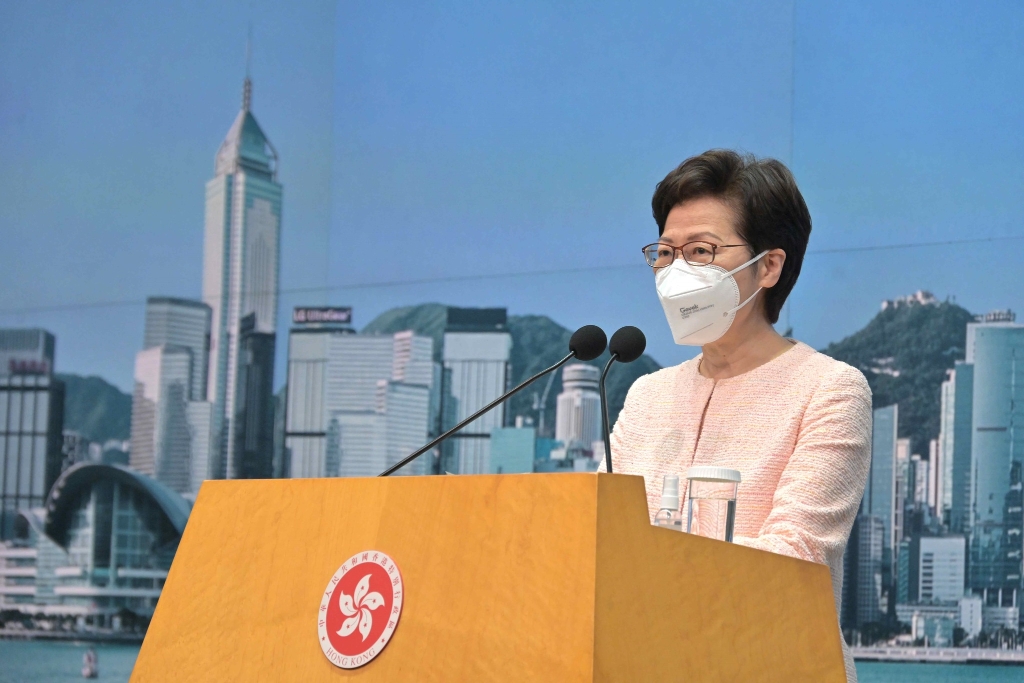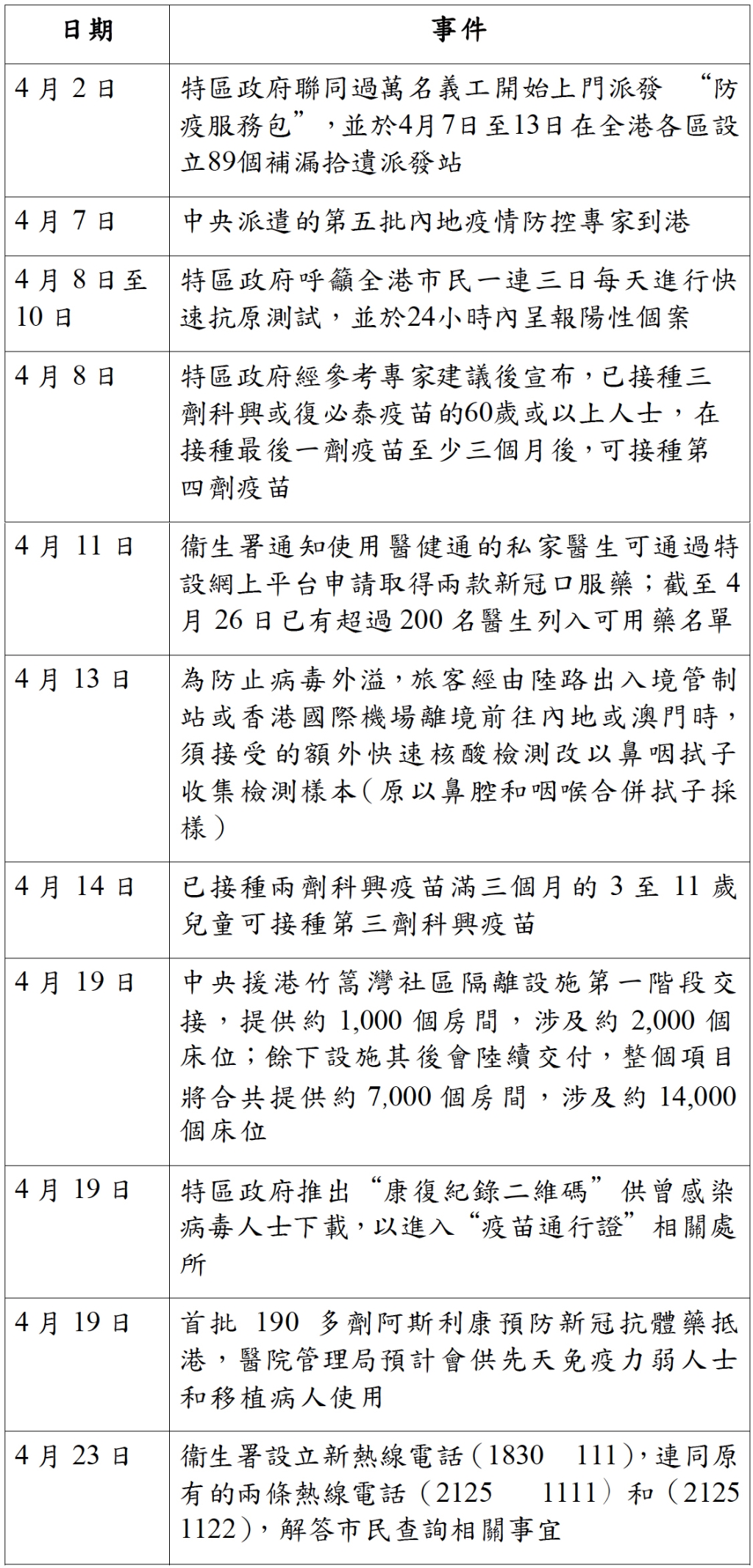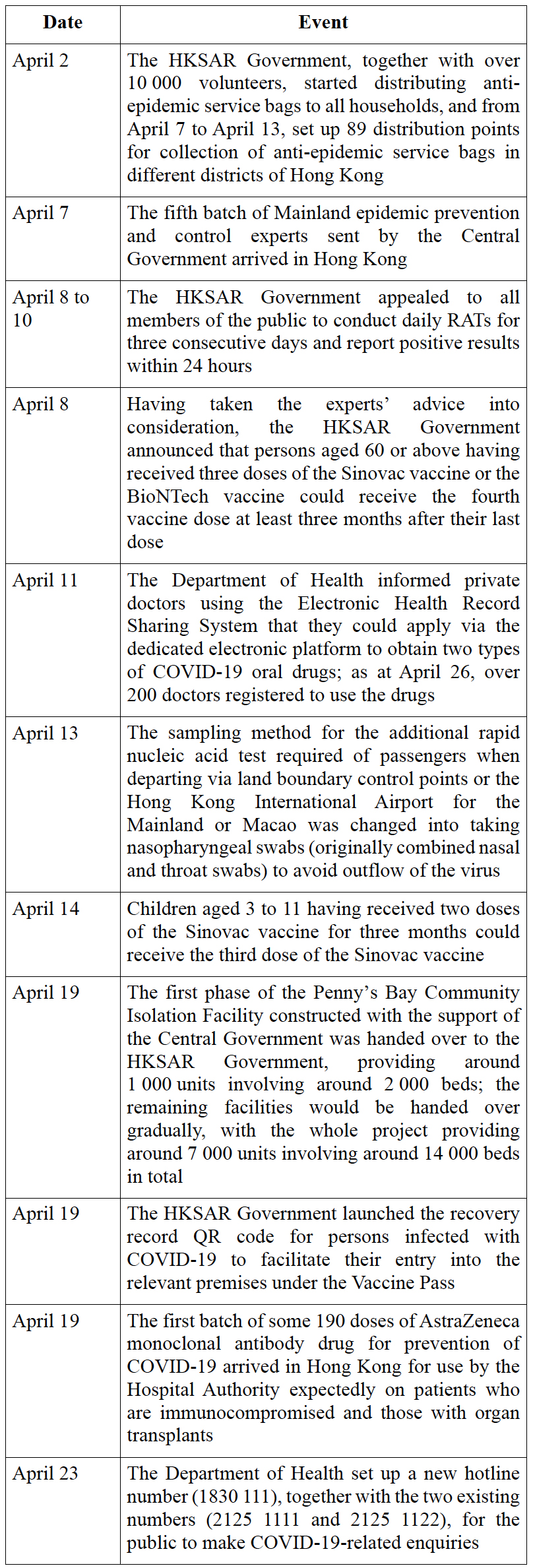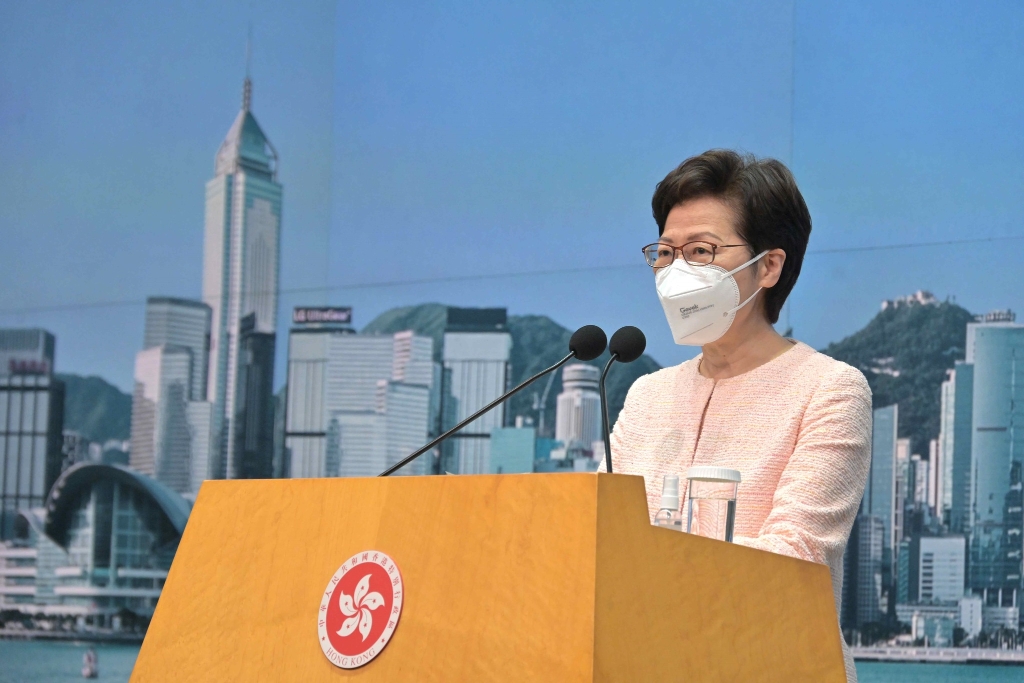香港第五波新冠疫情逐步受控,特区政府自四月下旬分阶段调整各项限制措施,推动社会有序恢复正常运作。今日(28日)香港特区行政长官林郑月娥在社交平台上发文,总结第五波疫情至今特区政府在各方面的工作成果。林郑月娥提醒市民,复常之路来之不易,不应掉以轻心,须继续支持抗疫工作,以最小代价实现最大防控效果,尽量减少疫情对社会经济发展的影响。
文|香港特区行政长官 林郑月娥

在中央的全力支援下,香港特别行政区政府全面提升了本地的抗疫能力,加上社会各界的通力合作,本港第五波新冠疫情逐步受控,阳性检测个案数字自3月初达峰后呈持续下降趋势,复活节假期后亦无出现明显反弹,让特区政府可如期自4月下旬分阶段调整各项限制措施,推动社会有序回复正常运作。纵然疫情回稳,为与内地“通关”创造条件,特区政府定当坚持“外防输入、内防反弹”的策略,竭力以最小代价实现最大防控效果,尽量减少疫情对社会经济发展的影响。
阳性个案数字持续下降
本港第五波疫情暴发至今,共录得1,190,437宗阳性检测个案,当中包括9,069宗死亡个案。阳性检测个案的单日呈报数字曾在3月初一度高达70,000多宗,随后持续下降,自3月26日起跌至四位数,自4月15日起跌至三位数,到近日录得300至400宗。此外,各项辅助监测疫情的指标,即污水监测病毒量、“围封强检”阳性比率和社区检测阳性比率均呈向下趋势。长者在这波疫情所受影响尤深。累计死亡个案的年龄中位数是86岁,超过九成的个案均为65岁或以上的长者。超过五成为居于院舍的人士;超过九成的个案有已知长期病患情况;超过七成没有接种任何新冠疫苗。
继续落实“三减”、“三重”、“一优先”策略
过去一个月,由我担任主席的跨部门督导委员会暨指挥中心除继续密切监测疫情外,亦按内地专家意见全面落实“三减”、“三重”、“一优先”的策略,即减少感染、减少重症、减少死亡,以及就重点人群、重点机构和重点区域采取更精准、有力及具针对性的措施,并把支援长者列为优先工作。
特区政府痛定思痛,为了加强保护长者,联同医院管理局以至社会各界在过去数月努力不懈,用好中央支持,结合中西医药治疗,并成立由劳工及福利局常任秘书长领导的工作小组,全面理顺照顾院舍长者的防疫措施。其中在4月初投入服务、位处启德邮轮码头可提供约1,200张病床的长者暂托中心,更汇集了两所大学的中西医学科、两间非政府福利机构、一个私营医疗集团的医疗人员和社会福利署直接招聘的内地照顾员,全方位照顾确诊长者,缔造一个医社、公私营合作的极佳例子,提升收治及救治病人的能力。
一连三日全城自我快测行动
凭藉中央在供港医疗物资的大力支持,特区政府在4月首周顺利向全港270多万个家庭派发300万份“防疫服务包”,其后在4月8日至10日发起“全城自我快测”行动,呼吁全港市民一连三日每天善用“防疫服务包”内的快速抗原测试剂进行快测,并就阳性结果上报卫生防护中心的网上申报系统。
特区政府感谢市民积极响应,是次行动整体上达致三个目的,即更好掌握本地感染情况、从社区揪出更多隐性传播链,从而安排适切隔离和治疗,以及让市民更习惯应用快速抗原测试,加强防疫意识。
由于长者接种疫苗比率仍不理想,为加强推动长者恒常自我监察身体状况,从而一旦感染后便可及早获得适切治疗,特区政府自4月初向所有70岁或以上长者于社区检测中心及流动采样站提供免费核酸检测服务,并由4月19日起至5月底通过不同途径(包括地区康健中心及地区康健站、长者健康中心等)向长者免费派发快速抗原测试套装。
逐步恢复常态
随着本地社区感染情况趋缓,特区政府如期落实我在3月21日公布的各项措施,在妥善管控风险的前提下,逐步有序恢复社会及经济活动:
(a)学校自4月19日起分阶段恢复面授课堂。为加强保障校园卫生和师生健康,除要求校方做足防护措施外,特区政府亦在现阶段要求学校全体教职员和学生须每天完成快速抗原测试,取得阴性结果才可回校;
(b)香港中学文凭考试如期在4月22日开考。为确保今年为数共约50,000名考生在安全环境下安心应考,特区政府联同香港考试及评核局和学界加强预防措施,并把考试时间表压缩至三星期;在要求所有考生和考务人员每天考试前进行快速抗原测试、取得阴性结果方可进入一般试场的同时,特区政府在竹篙湾社区隔离设施设立特别试场,供正接受强制检疫及确诊的考生应考;
(c)首阶段放宽社交距离措施自4月21日起落实,以回应市民和各行各业的殷切诉求。首阶段包括容许餐饮处所恢复晚市堂食(另要求员工每三天进行一次快速抗原测试);重开大部分早前关闭的处所,即室内及户外体育处所、健身中心、美容院及按摩院、公众娱乐场所(包括电影院)、游乐场所、游戏机中心、活动场所及宗教处所;容许恢复不超过30人的本地游(如所有游客在出团当天先进行快速抗原测试,人数限制可放宽至100人);调整在公众地方进行聚集的人数上限由两人改为四人,并解除早前禁止涉及两户以上的人士在私人地方进行多户聚集的规定;
(d)由4月1日起撤销对九个国家的地区性航班“熔断机制”,并在实行“外防输入”措施的前提下,理顺曾在任何海外地区逗留的香港居民的登机、检疫及检测安排;以及宣布由5月1日起容许非香港居民从海外地区入境香港,并适度调整个别航线“熔断机制”。
疫苗接种的最新情况
提升疫苗接种率仍是特区政府抗疫的重要手段。虽然12岁或以上市民的第一针接种率已超过九成、第二针接种率亦将达九成,但现时接种了第一剂疫苗的3至11岁群组和70岁或以上人士的比率,分别只为六成多和七成多,远低于其他年龄组别。特区政府会继续重点推动“一长一幼”尽早接种疫苗,包括在4月26日正式开展“疫苗到户接种服务”,派出外展医护团队上门为已登记的70岁或以上未曾接种疫苗的长者和因疾病或残疾而行动不便的人士接种疫苗;展开新一阶段院舍疫苗接种工作,务求尽快把现在的首针七成多比率推高至九成;加强为学童提供多元化、便利的疫苗接种途径;以及严格推行“疫苗通行证”,即4月底要求进入相关处所人士要已接种两剂疫苗,而到5月底则提高至三剂。
其他主要防控疫情及相关措施按时序列于下表:

支援企业回复元气
保障员工就业
自特区政府在3月18日公布“2022保就业”计划的初步框架后,不少立法会议员和相关业界表示大力支持,但也同时提出额外诉求。在聆听各方意见后,我在4月7日公布“2022保就业”计划完善版,引入优化措施,包括:取消合资格获取工资补贴的雇员的月薪上限;容许雇主选择以“2020保就业”计划数据或2021 年第四季实际聘用人数为合资格获取工资补贴的雇员人数上限;容许受第五波疫情影响较微的行业也可申请工资补贴,但以100名员工为限(由“剔除名单”,修订为“受限名单”);涵盖兼职员工、临时员工,以及有强积金户口的自雇人士和65岁或以上雇员。随着立法会财务委员会在4月12日通过430亿元拨款,计划将由4月29日起接受申请。
此外,属第六轮“防疫抗疫基金”下的“临时失业支援”计划,至4月12日截止申请日共收到超过470,000个申请,至今计划已向101,000名合资格人士发放一笔过10,000元的补贴。
复常之路来之不易
社会须继续支持抗疫工作
本港第五波新冠疫情暴发至今历时四个多月,从2、3月的惊涛骇浪到4月的曙光渐露,确是一段艰辛的旅程。然而,面对新冠疫情在全球肆虐未见明显息止,加上本港确诊个案每日仍有数百宗,特区政府绝不松懈,市民亦不应掉以轻心,让我们继续用好中央支持,贯彻落实“早发现、早隔离、早治疗”的措施,进一步稳控疫情,推动社会有序复常,确保市民生命安全和身体健康,确保社会大局稳定,并重振香港作为连通海内外的重要桥梁角色和枢纽地位。
With Epidemic under Control comes Path towards Normalcy
Carrie Lam
Chief Executive, Hong Kong S.A.R.
Leveraging the full support of the Central Government, the Government of the Hong Kong Special Administrative Region (HKSAR) has enhanced its anti-epidemic capability on all fronts. This, together with the full co-operation of various sectors in society, has led to gradual stabilisation of the fifth wave of the epidemic in Hong Kong. The number of cases tested positive for COVID-19 has been trending downward continuously after reaching the peak in early March with no significant resurgence observed after the Easter holidays, enabling the HKSAR Government to adjust various restrictive measures in phases from late April as planned to get society back to normal in an orderly manner. Although the epidemic situation continues to stabilise, in order to create conditions for the resumption of people flow with the Mainland, the HKSAR Government will steadfastly take forward the strategies of “guarding against the importation of cases and the resurgence of domestic infections” to achieve the greatest anti-epidemic effect at the smallest cost while minimising the impact of the epidemic on Hong Kong’s social and economic development.
Epidemic development
Since the outbreak of the fifth wave of the epidemic, we have recorded 1,190,437 cases tested positive for COVID-19 (including 9,069 deaths).
The number of daily reported positive cases reached a peak of some 70,000 in early March and trended downward continuously afterwards.
The daily caseload dropped to a four-digit number from March 26 and further to a three-digit number from April 15, with 300 to 400 cases recorded daily these days. A downward trend was also observed in other monitoring indicators such as the viral load in sewage surveillance tests, the percentage of positive cases found in restriction-testing declaration operations and the percentage of positive cases in tests conducted at the community level.
Elderly persons have been particularly hard hit by this wave of the epidemic. Among the death cases reported thus far, the median age is 86. Over 90% of the cases are people aged 65 or above. Over 50% are residential care home residents; over 90% are patients with known chronic diseases; and over 70% have not received any COVID-19 vaccine.
Continuing with the strategy of “three reductions, three focuses and one priority”
In the past month, the inter-departmental Steering Committee cum Command Centre chaired by me continued to closely monitor the epidemic development and, on the advice of the Mainland experts, implement in a full-fledged manner the strategy of “three reductions, three focuses and one priority”, namely reducing infections, severe cases and deaths, adopting more precise, stronger and more targeted measures on certain groups of people, premises and areas, and according priority to supporting the elderly.
Having learnt from the painful experience, the HKSAR Government, together with the Hospital Authority and various sectors of the community, worked doubly hard over the past few months to make good use of the Central Government’s support and integrate Chinese and Western medicines in treatment in order to strengthen protection for the elderly. A dedicated task force led by the Permanent Secretary for Labour and Welfare was set up to rationalise the implementation of anti-epidemic measures to protect residents at elderly care homes. As a case in point, the holding centre located at the Kai Tak Cruise Terminal came into service in early April to provide some 1,200 beds for the elderly. Healthcare workers from the Western and Chinese medicine disciplines of two universities, two non-governmental welfare organisations and a private healthcare group, as well as Mainland care workers employed directly by the Social Welfare Department, are working in concert to provide comprehensive care for the infected elderly at the centre. This is an excellent example of medical-social collaboration and public-private partnership to enhance the capability in the admission and treatment of patients.
Three-day city-wide rapid antigen test (RAT) exercise
With the strong support of the Central Government in medical supplies, the HKSAR Government successfully distributed 3 million anti-epidemic service bags to more than 2.7 million households in Hong Kong in the first week of April. Later on, it initiated a three-day city-wide RAT exercise, calling on members of the public to conduct daily tests for three consecutive days from April 8 to 10 using the RAT kits in the anti-epidemic service bags and report positive results to the online declaration system of the Centre for Health Protection. With favourable response from the public, the exercise has largely achieved its three objectives, namely having a better grasp of the local infection situation, identifying in the community more silent transmission chains to arrange for those infected appropriate isolation and treatment, and enabling the public to familiarise themselves with the use of RATs so as to raise their anti-epidemic awareness.
As the vaccination rate of the elderly has yet to reach a satisfactory level, it is necessary to further encourage the elderly to monitor their own health condition regularly such that early appropriate treatment can be arranged for them once they are found to be infected. The HKSAR Government has provided free COVID-19 nucleic acid testing service for all the elderly aged 70 or above at the community testing centres and mobile specimen collection stations since early April, and distributed free RAT kits to the elderly through various channels (including District Health Centres, District Health Centre Expresses and Elderly Health Centres) since April 19 until the end of May.
Return to normalcy gradually
With the local infection situation having stabilised, the HKSAR Government has proceeded to implement the various measures announced by me on March 21 as planned to resume social and economic activities in a gradual, orderly and risk-controlled manner:
(a) schools resumed face-to-face classes in phases from April 19. In order to keep the school environment hygienic and better safeguard the health of teachers and students, besides requiring schools to take adequate protective measures, the HKSAR Government for the time being also requires all teachers, school staff and students to conduct an RAT every day and allow only those with a negative result to go to school;
(b) this year’s Hong Kong Diploma of Secondary Education Examination commenced on April 22 as scheduled. To ensure that the 50 000-odd candidates can take the examination in a safe environment, the HKSAR Government, jointly with the Hong Kong Examinations and Assessment Authority and the school sector, has strengthened precautionary measures and compressed the examination timetable to three weeks. All candidates and examination personnel are required to conduct an RAT before the examination every day and only those with a negative result can enter the normal examination centres. The HKSAR Government has also set up a special examination centre at the Penny’s Bay Community Isolation Facility for candidates undergoing compulsory quarantine and candidates confirmed with COVID-19 to sit for the examination;
(c) the first-phase relaxation of the social distancing measures started on April 21 meeting the keen demand of members of the public and various trade sectors. Dinnertime dine-in services are allowed to resume at catering premises (and staff members are required to conduct an RAT every three days); most previously closed premises (i.e. indoor and outdoor venues of sports premises, fitness centres, beauty parlours and massage establishments, places of public entertainment (including cinemas), places of amusement, amusement game centres, event premises and religious premises) are allowed to re-open; local group tours with no more than 30 persons are allowed to resume (and if all tour participants have conducted an RAT before tour activities commence on the day, the number of participants allowed will be relaxed to 100); the number of persons allowed in group gatherings in public places is raised from two to four; and the restriction on multi-household gathering (i.e. prohibition of gatherings in private places involving more than two households) is lifted; and
(d) the place-specific flight suspension mechanism for nine countries was lifted with effect from April 1. While the boarding, quarantine and testing arrangements for Hong Kong residents (HKRs) who have stayed in overseas places have been rationalised on the premise of continuously guarding against importation of cases, the HKSAR Government has announced that non-HKRs be allowed to enter Hong Kong from overseas places and that the route-specific flight suspension mechanism be suitably adjusted with effect from May 1.
Latest vaccination situation
Boosting the vaccination rate remains one of the important means for the HKSAR Government to fight the virus. Over 90% of people aged 12 or above have received the first dose of COVID-19 vaccine while the percentage of those having received the second dose will soon reach 90%. Yet, the first-dose vaccination rate for children aged 3 to 11 and that for elderly persons aged 70 or above have only reached 60% and 70% respectively, far lower than those of other age groups. The HKSAR Government will continue to further boost the vaccination rates of children and the elderly as a matter of priority. For instance, the Home Vaccination Service was launched on April 26 such that outreach teams can provide door-to-door vaccination service for registered unvaccinated elderly persons aged 70 or above and persons with impaired mobility due to illness or physical disability; a new stage of outreach vaccination service has been rolled out to boost the first-dose vaccination rate at residential care homes from the current rate of over 70% to 90% as soon as possible; diverse and convenient channels have been made available for children to receive vaccination; and the Vaccine Pass will continue to be strictly implemented, requiring all the people entering relevant premises to have received two and three vaccine doses with effect from the end of April and the end of May respectively.
The other major anti-epidemic and related measures introduced are tabulated below in the chronological order:

Supporting enterprises to regain vigour and safeguard jobs
Since the HKSAR Government’s announcement of the preliminary framework of the 2022 Employment Support Scheme (ESS) on March 18, many Legislative Council (LegCo) Members and the relevant sectors have expressed strong support while raising further requests. After listening to the views of various parties, I announced on April 7 the refined version of the 2022 ESS. The enhancement measures included: removing the monthly salary cap for employees eligible for the wage subsidy; allowing employers to choose either the 2020 ESS data or the fourth quarter of 2021 for setting the number of headcounts eligible for the wage subsidy; allowing the industries which are less affected by the fifth wave of the epidemic to apply for the wage subsidy, with 100 employees as the cap (with the Exclusion List amended into the Restricted List); covering part-timers, temporary staff, as well as self-employed persons, and employees aged 65 or above, with Mandatory Provident Fund accounts. Following the passage of the funding application worth $43 billion by the Finance Committee of LegCo on April 12, the scheme will be open for applications starting April 29.
Besides, the Temporary Unemployment Relief Scheme under the sixth round of the Anti-epidemic Fund has received over 470,000 applications by the deadline of April 12. A one-off subsidy of $10,000 has been disbursed to 101,000 eligible persons thus far.
It has been over four months since the outbreak of the fifth wave of the epidemic in Hong Kong. We have gone through an arduous journey, having ridden out the storms in February and March, while seeing the dawn in April. Nonetheless, as the epidemic situation across the globe shows no sign of abating and we still see hundreds of confirmed cases in Hong Kong every day, the HKSAR Government will stay vigilant and members of the public should not let their guard down. With the support of the Central Government, we will continue to steadfastly implement the measures of “early identification, early isolation and early treatment” to further stabilise the epidemic situation and enable society to return to normalcy in an orderly manner. Let us join hands to safeguard the safety and health of all and ensure the overall stability in society, reinvigorating Hong Kong’s integral role as a bridge and a hub connecting with the Mainland and overseas places!
扫描二维码分享到手机














